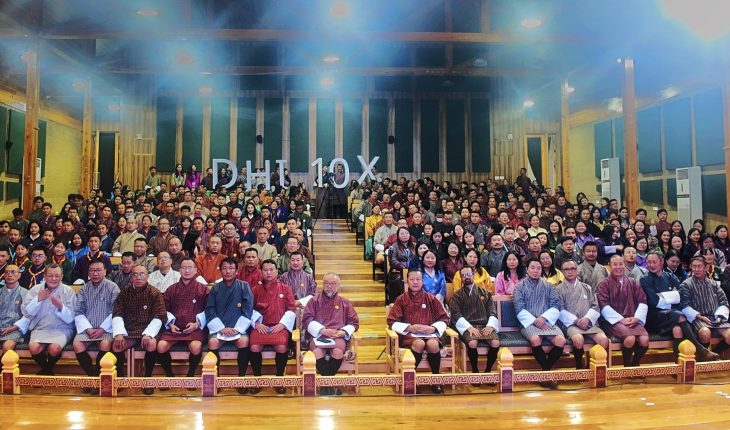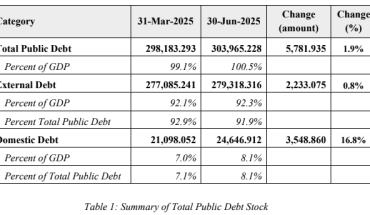
NGAWANG JAMPHEL
Thimphu
Druk Holding and Investments Ltd. (DHI), Bhutan’s sovereign investment arm, has launched the 10X DHI Group Roadmap, a long-term plan to increase the group’s economic contribution tenfold by 2035 on 14 August 2025.
The launch signals a decisive shift in Bhutan’s economic development strategy, aiming to position the country as a high-income, innovation-driven, and globally competitive economy.
The 10X Roadmap is closely aligned with the Royal Government’s 21st Century Economic Roadmap and is inspired by the vision of the Gelephu Mindfulness City.
At its core, the roadmap outlines investments in several high-impact sectors that can serve as the engines of growth.
These include renewable energy, with hydropower and solar identified as priority areas, green manufacturing that supports environmentally friendly production, and infrastructure development across physical, digital, and financial domains.
The plan also highlights the role of mines and minerals, while placing special focus on deep technology, advanced research, and frontier innovation.
By concentrating on these areas, DHI seeks to diversify the national economy, reduce dependence on a few industries, and build long-term competitiveness in a rapidly evolving global marketplace.
The strategic architecture of the roadmap rests on three main pillars. The first pillar is portfolio management, which emphasizes the need to maximize value from DHI’s existing companies while diversifying into new industries.
With 25 companies currently under its management, DHI aims to strengthen their performance and ensure that they contribute more meaningfully to the economy.
At the same time, diversification into emerging sectors will ensure Bhutan’s economy is not over-reliant on hydropower alone.
The second pillar is investment strategy, which aims to establish specialized investment platforms that can mobilize capital in five priority sectors: energy and resources, mines and minerals, infrastructure, manufacturing and services, and global securities.
This approach is designed to attract both domestic and international investors and provide Bhutan with greater access to global markets.
By opening up investment opportunities in diverse sectors, DHI plans to unlock new streams of revenue, enhance financial resilience, and create space for the private sector to grow alongside government-backed initiatives.
The third pillar is innovation strategy, which is seen as central to the roadmap. Bhutan has recognized that innovation and entrepreneurship are essential for building a modern economy.
The roadmap envisions the creation of a dynamic national innovation ecosystem that will foster research, product development, and new business models.
Institutions such as the Jigme Namgyel Wangchuck Super Fab Lab and the DHI InnoTech platform are expected to serve as hubs for collaboration between academia, industry, and international partners.
Through these initiatives, Bhutan aims to cultivate a start-up economy where young entrepreneurs can experiment, scale their ideas, and compete globally.
Supporting these three pillars are strategic enablers in financing, technology, and human talent. Financing strategies will ensure that adequate capital is available to support ambitious projects.
Technology strategies will focus on adopting and integrating new tools that enhance productivity and efficiency across industries.
Human talent strategies will prioritize education, skills development, and training to prepare Bhutanese citizens, especially the youth, to actively participate in the new economy.
To institutionalize these approaches, DHI is also creating Centers of Excellence dedicated to environmental, social, and governance standards, project management, monitoring and evaluation, and research and development.
These centers will help ensure that projects are implemented with accountability, innovation, and sustainability at their core.
The roadmap’s long-term goals are both ambitious and clear. By 2035, DHI envisions achieving a revenue base of Nu. 700 billion, establishing a Nu. 30 billion Bhutan Future Fund, and developing a diversified and resilient national portfolio.
These achievements are expected to transform Bhutan into a globally relevant innovation hub powered by its own citizens. At the heart of this vision is the empowerment of Bhutanese youth, who will play a central role in shaping the future economy.
With the right skills and opportunities, young people will be able to drive entrepreneurship, technological advancement, and new industries that align with Bhutan’s values and long-term aspirations.
The 10X Roadmap is also significant for the private sector. For years, Bhutan’s economy has relied heavily on hydropower exports and government-driven projects, leaving limited space for private businesses to thrive.
By diversifying into multiple sectors and encouraging innovation, the roadmap creates room for private enterprises, start-ups, and entrepreneurs to actively participate in national development.
Another important dimension of the roadmap is its connection to the global economy.
By mobilizing international investment and fostering partnerships with strategic global players, Bhutan seeks to secure not only financial resources but also knowledge, technology, and market access.
With global attention on environmental responsibility, Bhutan has consistently presented itself as a model for green development. By focusing on renewable energy, green manufacturing, and environmental governance, DHI is ensuring that economic growth is balanced with
The launch brought together DHI Group members, Board members, and students from Yangchenphug and Motithang Higher Secondary Schools, symbolizing the bridge between today’s decisions and opportunities for the next generation.





